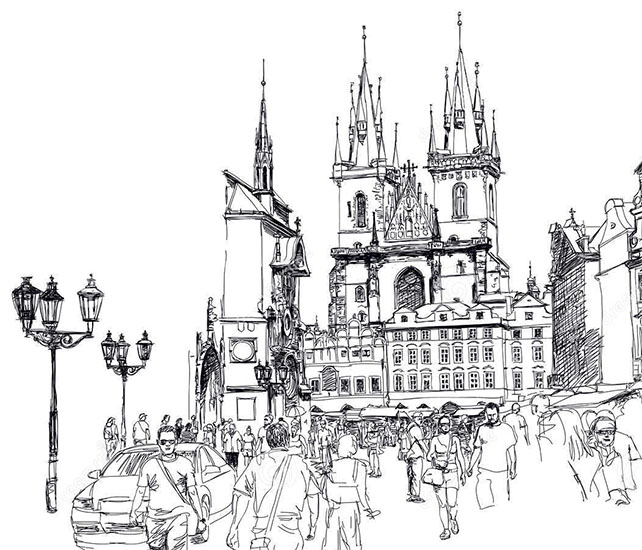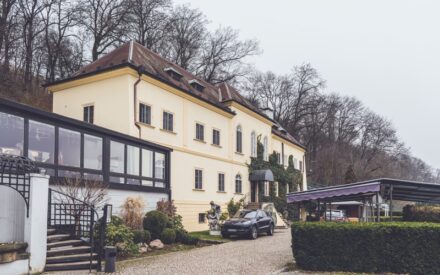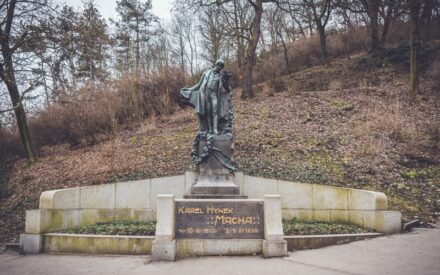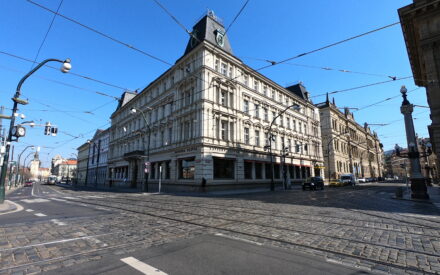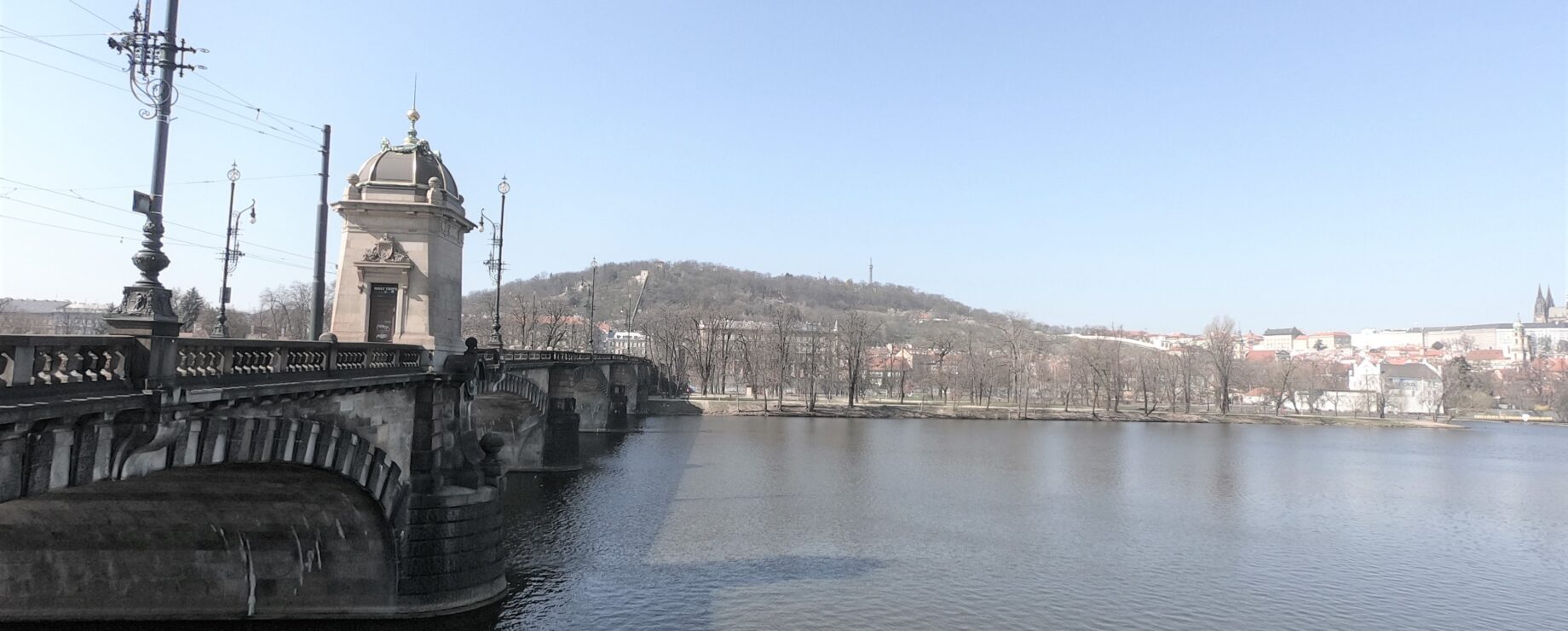
Petřín
Petřín Hill begins at the stairs which Prague Germans named the Eternal Way (Ewige Stiege; and to which Vlašská Street ascends). This ends at the observation tower 60 metres high which was constructed in 1891 following the example of the Eiffel Tower in Paris. Going up the tower is well worth it for all devotees of Franz Kafka and his novel The Trial, as from the summit one can very clearly see the whole trail that Josef K. who was sentenced to death had to cover. Kafka does not describe the individual places directly by their names, but various hints let it be quite obvious where Josef K. had to go with his two guides. It can be assumed they had to cross Charles Bridge, because the view over to Shooting Island (Střelecký ostrov) is clearly mentioned in the text and can only be beheld from Charles Bridge. They then continue into Malá Strana around the Military Command of the Austro-Hungarian Army (No. 15/258) and the police headquarters, which is hinted at by the large number of policemen passing by. Eventually they walk along Neruda Street and Úvoz to Strahov Monastery; at that time the city ended there, with a field behind the monastery, as is written in the text. And the execution itself then takes place in today’s Strahov Stadium, which has been built on the site of Strahov‘s quarry.
Franz Kafka: The Trial
In this way they quickly left the built up area and found themselves in the fields which, in this part of town, began almost without any transition zone. There was a quarry, empty and abandoned, near a building which was still like those in the city. Here the men stopped, perhaps because this had always been their destination or perhaps because they were too exhausted to run any further. Here they released their hold on K., who just waited in silence, and took their top hats off while they looked round the quarry and wiped the sweat off their brows with their handkerchiefs. The moonlight lay everywhere with the natural peace that is granted to no other light.
After exchanging a few courtesies about who was to carry out the next tasks the gentlemen did not seem to have been allocated specific functions one of them went to K. and took his coat, his waistcoat, and finally his shirt off him. K. made an involuntary shiver, at which the gentleman gave him a gentle, reassuring tap on the back. Then he carefully folded the things up as if they would still be needed, even if not in the near future. He did not want to expose K. to the chilly night air without moving though, so he took him under the arm and walked up and down with him a little way while the other gentleman looked round the quarry for a suitable place. When he had found it he made a sign and the other gentleman escorted him there. It was near the rockface, there was a stone lying there that had broken loose. The gentlemen sat K. down on the ground, leant him against the stone and settled his head down on the top of it. Despite all the effort they went to, and despite all the co-operation shown by K., his demeanour seemed very forced and hard to believe. So one of the gentlemen asked the other to grant him a short time while he put K. in position by himself, but even that did nothing to make it better. In the end they left K. in a position that was far from the best of the ones they had tried so far. Then one of the gentlemen opened his frock coat and from a sheath hanging on a belt stretched across his waistcoat he withdrew a long, thin, double-edged butcher’s knife which he held up in the light to test its sharpness. The repulsive courtesies began once again, one of them passed the knife over K. to the other, who then passed it back over K. to the first. K. now knew it would be his duty to take the knife as it passed from hand to hand above him and thrust it into himself. But he did not do it, instead he twisted his neck, which was still free, and looked around. He was not able to show his full worth, was not able to take all the work from the official bodies, he lacked the rest of the strength he needed and this final shortcoming was the fault of whoever had denied it to him. As he looked round, he saw the top floor of the building next to the quarry. He saw how a light flickered on and the two halves of a window opened out, somebody, made weak and thin by the height and the distance, leant suddenly far out from it and stretched his arms out even further. Who was that? A friend? A good person? Somebody who was taking part? Somebody who wanted to help? Was he alone? Was it everyone? Would anyone help? Were there objections that had been forgotten? There must have been some. The logic cannot be refuted, but someone who wants to live will not resist it. Where was the judge he’d never seen? Where was the high court he had never reached? He raised both hands and spread out all his fingers.
But the hands of one of the gentleman were laid on K.’s throat, while the other pushed the knife deep into his heart and twisted it there, twice. As his eyesight failed, K. saw the two gentlemen cheek by cheek, close in front of his face, watching the result. “Like a dog!” he said, it was as if the shame of it should outlive him.
In describing the topographical realities in this passage, one can clearly observe the typical manner of Kafka’s literary work – again, real and dream realities are combined and everything is intertwined. There was no town house at the Strahov quarry at that time. Rather, it seems likely that Kafka brought it here from the Kinský garden at the opposite foot of Petřín Hill, where we know from his diaries that he sometimes went for a walk. Alternatively, he could have been referring to the houses near the path to Strahov, which led from the other side of the hill (now Pěší Street), where several houses actually stood at that time.
Kafka’s The Trial also inspired Milan Kundera in his novel The Unbearable Lightness of Being. One of the main characters, Tereza, forbids herself to be jealous of the other character, Tomáš, even though his hair still “smells of a strange woman’s lap”, but she cannot help the feeling. So she turns to Tomáš to help her, and he sends her to Petřín, where “everything should be arranged”.
Milan Kundera: Nesnesitelná lehkost bytí
Coming out at the foot of Petrin Hill, that great green mound rising up in the middle of Prague, she was surprised to find it devoid of people. This was strange, because at other times half of Prague seemed to be milling about. It made her anxious. But the hill was so quiet and the quiet so comforting that she yielded fully to its embrace. On her way up, she paused several times to look back: below her she saw the towers and bridges; the saints were shaking their fists and lifting their stone eyes to the clouds. It was the most beautiful city in the world.
At last she reached the top. Beyond the ice-cream and souvenir stands (none of which happened to be open) stretched a broad lawn spotted here and there with trees. She noticed several men on the lawn. The closer she came to them, the slower she walked. There were six in all. They were standing or strolling along at a leisurely pace like golfers looking over the course and weighing various clubs in their hands, trying to get into the proper frame of mind for a match.
She finally came near them. Of the six men, three were there to play the same role as she: they were unsettled; they seemed eager to ask all sorts of questions, but feared making nuisances of themselves and so held their tongues and merely looked about inquisitively.
The other three radiated condescending benevolence. One of them had a rifle in his hand. Spotting Tereza, he waved at her and said with a smile, Yes, this is the place.
She gave a nod in reply, but still felt extremely anxious.
The man added: To avoid an error, this was your choice, wasn´t it?
It would have been easy to say, No, no! It wasn’t my choice at all! but she could not imagine disappointing Tomas. What excuse, what apology could she find for going back home? And so she said, Yes, of course. It was my choice.
The man with the rifle continued: “Let me explain why I wish to know. The only time we do this is when we are certain that the people who come to us have chosen to die of their own accord. We consider it a service.”
He gave her so quizzical a glance that she had to assure him once more: No, no, don’t worry. It was my choice.
Would you like to go first? he asked.
Because she wanted to put off the execution as long as she could, she said, No, please, no. If it’s at all possible, I’d like to be last.
As you please, he said, and went off to the others. Neither of his assistants was armed; their sole function was to attend to the people who were to die. They took them by the arms and walked them across the lawn. The grassy surface proved quite an expanse; it ran as far as the eye could see. The people to be executed were allowed to choose their own trees. They paused at each one and looked it over carefully, unable to make up their minds. Two of them eventually chose plane trees, but the third wandered on and on, no tree apparently striking him as worthy of his death. The assistant who held him by the arm guided him along gently and patiently until at last the man lost the courage to go on and stopped at a luxuriant maple.
Then the assistants blindfolded all three men.
And so three men, their eyes blindfolded, their heads turned to the sky, stood with their backs against three trees on the endless lawn.
The man with the rifle took aim and fired. There was nothing to be heard but the singing of birds: the rifle was equipped with a silencing device. There was nothing to be seen but the collapse of the man who had been leaning against the maple.
Without taking a step, the man with the rifle turned in a different direction, and one of the other men silently crumpled. And seconds later (again the man with the rifle merely turned in place), the third man sank to the lawn.
One of the assistants went up to Tereza; he was holding a dark-blue ribbon. She realized he had come to blindfold her. No, she said, shaking her head, I want to watch.
But that was not the real reason why she refused to be blindfolded. She was not one of those heroic types who are determined to stare down the firing squad. She simply wanted to postpone death. Once her eyes were covered, she would be in death’s antechamber, from which there was no return.
The man did not force her; he merely took her arm. But as they walked across the open lawn, Tereza was unable to choose a tree. No one forced her to hurry, but she knew that in the end she would not escape. Seeing a flowering chestnut ahead of her, she walked up and stopped in front of it. She leaned her back against its trunk and looked up. She saw the leaves resplendent in the sun; she heard the sounds of the city, faint and sweet, like thousands of distant violins.
The man raised his rifle.
Tereza felt her courage slipping away. Her weakness drove her to despair, but she could do nothing to counteract it. But it wasn’t my choice, she said.
He immediately lowered the barrel of his rifle and said in a gentle voice, If it wasn’t your choice, we can’t do it. We haven’t the right.
He said it kindly, as if apologizing to Tereza for not being able to shoot her if it was not her choice. His kindness tore at her heartstrings, and she turned her face to the bark of the tree and burst into tears.
This guided walk is a part of the “Democracy on the Brink. Historical lessons from the late 1930s” project supported by the Europe for Citizens programme of the European Union.
Další místa na téma "A literary walk through Kafka’s Prague on the trail of his story Description of a Struggle"
